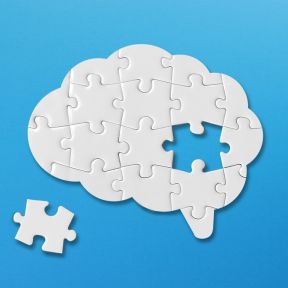
Mild Cognitive Impairment
Mild Cognitive Impairment (MCI) is a decline in cognitive function that may include compromised memory, language, or critical thinking. It is considered more serious than expected age-related decline but less serious and concerning than dementia. Some cases of MCI proceed to dementia and some do not, making such impairment especially alarming for some who experience it. A person with symptoms of impairment might begin losing items, for example, or forget scheduled appointments. While these changes are notable to the individual, they do not routinely interfere with activities of daily living.

Neurologists divide MCI into two broad categories: amnestic impairment, in which memory loss is the predominant symptom, and non-amnestic impairment, in which other cognitive areas, such as decision-making or spatial orientation, are primarily affected.
As we age, we expect some decline in cognitive abilities. However, mild impairment is that middle ground between a normal age-related cognitive loss and more serious diminishment of function. MCI can impact a person’s judgment, speech, and reasoning.
A minor decline in cognitive function can appear as early as the late twenties, but such decline is less pronounced until middle age, and it becomes more and more apparent among septuagenarians and people who are older.
Dementia is not the same as mild cognitive impairment. Dementia can impact a person’s daily living and activities. People with dementia, for example, forget whether they took their medication or have difficulty managing their finances.
In subjective cognitive decline, your daily function is normal, but you notice a slight decline in memory. If you visit your doctor and are deemed unimpaired, you may have SCD or subjective cognitive impairment. People with SCD may end up with a diagnosable memory disorder within five to 10 years.
People with MCI are normally able to drive a vehicle. However, the mini-mental status exam is recommended to evaluate impairment. Neurologists and physicians can administer such a test.

Clinicians rely on brief neurocognitive tasks, such as the mini-mental status exam, in which a patient is asked to state the current date, day of the week, and remember lists of items. Doctors also conduct family interviews and screen for comorbid conditions, such as depression, when deciding on a diagnosis.
It is important to rule out the side effects of medication, neurovascular problems, sleep deprivation, depression, or other factors that may be contributing to MCI and do not represent an underlying neurological process.
Even though people with MCI are at a higher risk of progressing to dementia compared to people of the same age without impairments, they may also remain stable for years, and an estimated 15 percent to 41 percent of patients will get better within a year of the diagnosis.

MCI affects about 6 percent of 60-year-olds and 25 percent of 80-year-olds, most of whom do not go on to develop neurodegenerative disorders, according to a 2018 report by the American Academy of Neurology. MCI is a complicated condition that involves many potential causes, both genetic and environmental, with age perhaps the most universal factor.
The ε4 allele of the APOE gene is strongly associated with MCI and Alzheimer’s in both men and women. However, it is unclear whether this variant of the gene just influences the chances of getting the diagnosis or if it also promotes conversion of MCI to Alzheimer’s or dementia.
You are more likely to develop MCI if: You are advanced in age; carry the APOE ε4 gene; are not intellectually engaged; suffer depression; or have poor health and conditions such as hypertension, diabetes, obesity, or high cholesterol.
Between the ages of 65 and 75 women seem to be more at risk for MCI, which may be related to menopause. But, in general, there is no difference between men and women according to a report in Jama Neurology.

Due to the complicated nature of the condition, treatment is best when tailored to each individual, which can range from taking the person off of a medication that might contribute to cognitive dysfunction to discussing care and planning for the future.
There are currently no FDA-approved drugs for treating MCI, and there is limited evidence that any drugs or supplements are effective.
Some lifestyle choices have been linked to better brain health, including regular physical activity, continuous learning, and social engagement. Dietary recommendations include adequate folic acid intake and a regimen high in fruits and vegetables and low in sugar, alcohol, and saturated fats.














